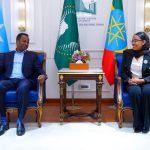Mogadishu (SONNA)-Every day, except Fridays, Beelo Botan and her team visit around 30 households in Howlwadaag village, Galkacyo, the third largest city in Somalia. They are among the many community rapid response teams set up by the Somali Government and WHO to help address COVID-19.
“Most people in Galkacyo know who we are, so they alert us as soon as someone has symptoms of COVID-19 or even polio-like symptoms,” says Beelo.
“I really enjoy my job because I am working for my community and my messages may have benefited many people, including those who had no idea how to keep safe from COVID-19,” she added.
The first case of COVID-19 in Somalia was declared on 16 March 2020. The government had been making determined efforts to strengthen its health system, move towards universal health coverage (UHC) and strengthen preparedness through the development of a National Action Plan for Health Security.
Somalia’s health challenges
Somalia, with a population of 15.4 million, is a low-income country. In terms of health, the main issues facing the population are communicable diseases and respiratory infections, and issues relating to maternal and child health-related morbidities and nutrition. Average life expectancy stands at 55.7 years and only 25% of Somali people have access to essential health services. According to the International Health Regulations index, only 6% of people in Somalia are protected from health emergencies and infectious hazards.
Preparing for emergencies in the UHC Roadmap
In 2019, the government, with support from WHO through the UHC Partnership, developed a UHC Roadmap for 2019-2023. One of the key objectives is “Ensuring that all Somali people can access the health services they need – without facing financial hardship – is key to improving the well-being of Somali people.” Somalia is benefitting from the important groundwork laid out in this roadmap, which included a strategy to prepare for responding to health emergencies in line with International Health Regulations (2005). The Ministry of Health, with WHO’s support, used this strategy to respond practically to COVID-19 in areas such as surveillance and case investigation, case management, infection prevention and control including strengthening laboratory capacities.
The UHC Partnership assists 115 countries in accelerating progress to achieve UHC through funding provided by the European Union (EU), the Grand Duchy of Luxembourg, Irish Aid, the Government of Japan, the French Ministry for Europe and Foreign Affairs, the United Kingdom – Foreign, Commonwealth & Development Office and Belgium.
Contributions from WHO and the UHC Partnership have also brought about a strong partnership between the EU delegation and WHO Somalia. This has evolved into a Bilateral Technical Coordination Mechanism for COVID-19 response. Through this, WHO provides technical assistance and advice to EU-funded projects and activities, and risk communication and awareness-raising initiatives related to COVID-19.
Essential package of health services
Alongside the UHC Roadmap, WHO supported the Ministry of Health and Human Services of Somalia to conduct a review and revision of Somalia’s Essential Package of Health Services so that all Somali people are able to access health care according to their needs. This includes a set of minimum services for maternal, newborn and child health, communicable and non-communicable diseases, mental health, injuries and – critically – pandemic and emergency preparedness, among others.
UHC now and for the future
Somalia is managing a strong response to COVID-19, with a UHC roadmap, an essential package of health services and international cooperation that supports the country’s priorities. Investing in UHC is helping the country protect its population from COVID-19 and future health threats, but it is also ensuring that the foundation is built so that all Somali people will have access to comprehensive quality health care without experiencing financial hardship.
@WHO





